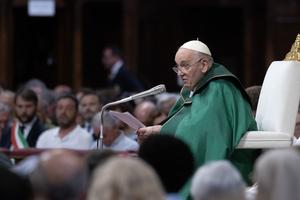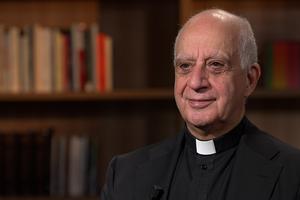Vatican Recalls Irish Nuncio
Rare move is designed to better understand Cloyne Report on abuse.
As Irish-Holy See relations sank to their lowest ebb in July, the Vatican recalled to Rome the apostolic nuncio to Ireland following the release of the Cloyne Report and an outspoken attack on the Holy See by Ireland’s Prime Minister Enda Kenny.
But the Vatican’s deputy spokesman, Passionist Father Ciro Benedittini, said the main intention of the recall on July 25 was not to send a message of strong disapproval to the Irish government (often the principle reason behind such diplomatic actions), but to give the Holy See a better handle on the crisis after the July 13 publication of the Cloyne Report.
Cloyne was the last in a series of state-funded reports into clerical sex abuse and the subsequent cover-up by Church authorities in Ireland. It will now be followed by an audit of 26 Catholic dioceses, carried out by a body that monitors the Church’s implementation of its own procedures to prevent abuse of minors by priests.
The product of a judicial inquiry into the Cloyne Diocese’s cover-up of alleged incidents of clerical sexual abuse since 1996, the report severely criticized the diocese for not reporting all cases to the authorities, including nine cases from 1996 and 2005 which “very clearly” should have been reported.
The document chastised the Vatican not for covering up the abuse, but for being “entirely unhelpful” to any bishop who wanted to implement procedures for dealing with child sex-abuse allegations. It further described the Vatican’s response as “unsupportive, especially in relation to the civil authorities.”
Father Benedittini stressed the “very rare” decision to recall the nuncio, Archbishop Giuseppe Leanza, was “to make it easier for the Secretariat of State and other offices of the Roman Curia to consult with the person who has direct experience of the situation in the country in order to prepare the Holy See’s official response to the Irish government in the wake of the Cloyne Report.”
He stressed the recall, being such a rare step, “denotes the seriousness of the situation and the Holy See’s desire to face it objectively and with determination.” But he added that the Holy See’s action didn’t “exclude some degree of surprise and disappointment at certain excessive reactions.”
The Vatican was stung by the words of some Irish politicians, in particular Enda Kenny. During a parliamentary debate July 20, Kenny accused the Vatican of taking a “calculating and devastating” position on abuses and that it was dominated by a culture of “elitism and narcissism.” He also accused the Holy See of trying to “hinder the investigation of a sovereign and democratic Republic as little as three years ago.”
The Holy See considered Kenny’s words “violent” and “inaccurate,” as they appeared to overlook procedures put in place by Cardinal Joseph Ratzinger in 2001 to deal with cases of abuse more quickly and exact punishment where necessary. Papal spokesman Father Federico Lombardi also recalled the “intense feelings of grief and condemnation expressed by the Pope” following the first Murphy Report on Dublin. Kenny also overlooked Benedict XVI’s forthright attempts to address the sexual-abuse crisis through his pastoral letter to Irish Catholics last year and during his visits to the United States, Britain, Australia and Malta.
As the Register went to press, it wasn’t clear if Archbishop Leanza was being permanently recalled, but his return to Rome did not denote a severing of diplomatic ties. Some believe, however, he may soon be replaced.
With this latest report, Irish-Holy See relations have reached their nadir and provoked an emotional response without a forensic examination of the facts. Church analysts in Ireland say the vast majority of Irish citizens supported the attacks on the Vatican by Kenny and other politicians, despite some of the outbursts being rhetorical and false.
“It has brought out a lot of festering public anger — and not just about the abuse,” said Michael Kelly, deputy editor of The Irish Catholic newspaper. “You have politicians trying to live down the legacy of their predecessors — an excessive deference, obsequiousness, in fact, towards the Holy See.”
For some time, critics have complained of a symbiotic relationship between church and state which they considered unhealthy for both sides and which helped bring the Church in Ireland to the verge of collapse. Father Vincent Twomey, an Irish theologian and former student of Benedict XVI, wrote in The Irish Times that, although Kenny was “badly served by his speechwriters,” he made an important admission: that the state, too, had to put its own house in order and that the government had not handled sex-abuse allegations much better than the Church.
Elsewhere, Father Twomey also called for all Irish bishops who assumed office before May 2004, when Archbishop Diarmuid Martin became archbishop of Dublin, to resign. “If the bishops have any love for the Church, would they please show it by making a sacrifice and stepping aside,” he said in a July 20 Irish Times report.
Kelly contended Father Twomey is “absolutely correct” and drew attention to the other ills plaguing the Church in Ireland. “Mishandling of clerical child abuse is a grievous form of governance, but it’s hardly the only form,” he said. “There’s also disastrous seminary formation, non-existent catechesis — our Church is in absolute disarray, and that’s not all due to scandals.”
Kelly said, for this reason, the results of the apostolic visitation to Ireland must be “very strong.”
“My worry, from a personal point of view, is that the Holy See may become all precious about this, feel unfairly criticized, and back themselves into a corner,” he said. “This is a moment where they need a cool head and, frankly, to show the depth of their maturity; anything that’s seen as too defensive will go down badly.”
Edward Pentin writes from Rome.














